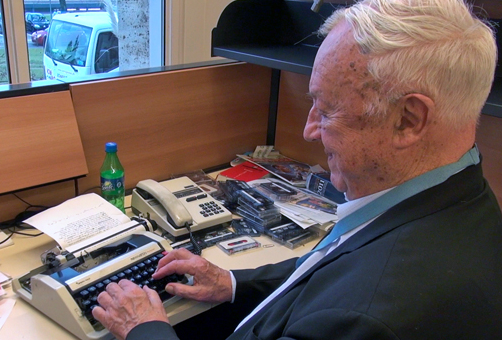People
At 86, Gordon Martin still bashes it out on a typewriter
Monday 3 February 2014
 Gordon Martin (photo), a resolutely analogue journalist in a digital world, still uses a manual typewriter to write his dispatches from Geneva, where he covers the United Nations.
Gordon Martin (photo), a resolutely analogue journalist in a digital world, still uses a manual typewriter to write his dispatches from Geneva, where he covers the United Nations.
Trained by Reuters in the age of the correspondent’s typewriter and editor’s pencil, the 86-year-old works without computer or mobile phone from a small cubicle at the far end of Press Room One at the Palais des Nations on the shores of Lake Geneva, where he reports on the world body for Vatican Radio.
The world of social media is a mystery to him. “I don’t have a mobile telephone,” he said recently. “I don’t understand a lot of modern gadgetry and I think sometimes gadgets get in the way of clear use of the English language. I’ve never tried anything else,” he admitted to the BBC, where he worked after a decade with Reuters.
Suspicion of technology is back in vogue in diplomatic circles following Edward Snowden’s revelations about electronic eavesdropping by the US National Security Agency, the BBC said. Russian media outlets reported last year that a Kremlin agency responsible for protecting high-ranking officials had bought a batch of old typewriters to prevent its communications from being hacked by Western powers.
Martin stumbled into journalism by accident nearly 60 years ago after studying classics and modern languages at Oxford University, followed by a spell as a teacher. In 1955, destined for a career in the wine business, he made a last-minute decision to take up a traineeship with Reuters instead. He could speak Italian and so was posted to Rome.
During one early assignment, to Madagascar, he learned one of the most important lessons for any young journalist. Personal contacts can be a reporter’s most valuable commodity. “I met a charming French lady who was a very good ballroom dancer and there was nothing the Minister of Information in Madagascar liked more than dancing the Charleston with this lady,” he recalled. “She said to the minister, ‘Either you give a contract to Mr Martin from Reuters (giving him permission to set up an office on the island) or I will never dance with you again.’ The minister immediately summoned me to his office and I signed the contract.”
After 10 years with Reuters, Martin took up the post of Latin America correspondent for the BBC. He reported from every country in the region - from Bolivia after the execution of Che Guevara, to Fidel Castro’s Cuba. After the death of President Gamal Abdel Nasser of Egypt in 1970 he moved to Cairo.
The clatter of Martin’s typewriter keys won’t be heard around the UN press room for much longer. “I think this year I’ll probably give up altogether because I can’t walk very well,” he said. “I have trouble with my legs and I find that I don’t have as much energy as I should have. I think I’ll just go on working until the end of this year and then call it a day.” ■
- « Previous
- Next »
- 339 of 515